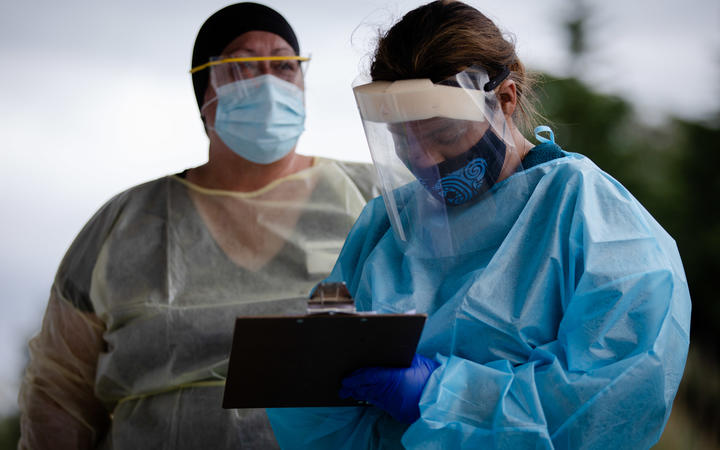A group of prominent New Zealand health professionals are pushing for the government to be better prepared for an outbreak of the Omicron variant Covid-19.
A group of experts suggests that New Zealand needs an “explicit shift” from a suppression approach to a mitigation approach. (file picture)
Photo: RNZ / Angus Dreaver
There have been few cases of the highly transmissible New Zealand variant in the community so far – the latest being a worker at MIQ in Auckland.
But Omicron has led to a dramatic rise in the number of cases around the world, including in Australia where more than 100,000 new cases of Covid-19 were reported every day for four consecutive days last week.
Professors Michael Baker and Nick Wilson of the University of Otago, Doctors Jennifer Summers and Amanda Kvalsvig, and Dr Matire Harwood of the University of Auckland said the government must “increase measures to delay the arrival of the Omicron variant in order to give more preparation time”.
“We can expect an outbreak of Omicron to be very intense.”
They suggested an “explicit shift” from a suppression to mitigation approach, and upgrading the alert level system as “ultimately the traffic light system lacks an adequate range of tools”.
Baker told RNZ this does not necessarily mean a return to a strict Level 4 lockdown: “It could be Alert Level 3 – a lighter version of that with people working from home if they could”.
The timing of the phased reopening of borders was “too soon” they say, although the government has already pushed back the first two phases to an unspecified date in late February.
It was also “necessary to drastically reduce the number of infected travelers arriving in [the country]”, they said.
The group suggested an urgent tightening of pre-departure testing requirements, which were recently relaxed to allow travelers from certain locations to provide rapid antigen tests (RATs) instead of PCR tests.
“One option would be to add a RAT requirement at foreign airports immediately before departure, alongside the current PCR requirement 48 hours before departure.”
There is a ‘much better chance’ of delaying the arrival of Omicron if New Zealand can ‘get the number of active cases at the border down to a more manageable number’, ideally less than five a day, they say. declared. And the use of RATs should play “an increasingly important role”, but must be introduced “in a way that promotes better decision-making and fairness”.
Now that RAT tests can be purchased privately, the group called for “a system for members of the public to upload RAT results to support ongoing disease surveillance”.
Thorough counseling and support should be provided to people to manage Covid-19 infection at home, the group said, with overseas experience suggesting most people infected with the Omicron variant could be treated at home. residence.
These tips should help people recognize if they are “severely” ill and need extra help, what supplies they should have to manage symptoms, and advice for minimizing household transmission.
They warned that with an outbreak of Omicron, “contact tracing will quickly become overwhelmed…and soon become ineffective” and the measures seen in the previous alert level system could be the “main tools to” flatten the curve “”.
The group said eliminating the Delta variant was “technically possible” and that it would put New Zealand “in a better position if it could be achieved before Omicron begins to circulate widely”.
At a briefing earlier today, Prime Minister Jacinda Ardern said New Zealand would switch to red light setting in the event of an outbreak of Omicron.
“What I expect is that over the next few weeks I will be able to share with you some of the additional preparation that has been done beyond the work we have done on Delta, for the specific issue of ‘Omicron and what it stands for. We have the ability to learn from other nations and see the impact or the way Omicron performs and prepare ourselves.”
Ardern said that would mean changes, including to how testing, isolation and contact tracing were carried out, and details would be shared in the coming weeks.


